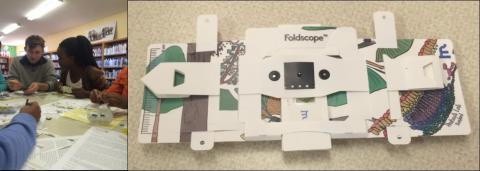
Max Coyle, a recent Biology graduate from the US, voluntarily came during his holiday time to introduce the foldscope to the Masinites. Max wanted to share his experiences of using the Foldscope with the learners, to feed their minds and make them think and see that the world is much more than what we see with the human eye.
This foldscope is a low-cost optical microscope that can be assembled from simple components, including a sheet of paper; a light-emitting diode; a watch battery that powers the LED and a lens (although natural light of lamp light can easily substitutde for the LED). This tool was developed by a team led by Jim Cybulski and Manu Prakash, an assistant professor in Bioengineering at the Stanford University. For more information you can click here and here.

Max introduced the microscope and its purpose to the learners and further took them through the assembly of the kit and how to operate it. By assembling the foldscope themselves, they got a chance to follow the instructions given by Max and put it together perfectly. The learners placed a small piece of leaf on the lens and what they saw was amazing and interesting, it brought up a lot of exciting questions! The fact that this foldscope is adjustable (can be moved up/down and side-ways) allowed the learners to see the microscopic world clearly and from different angles.
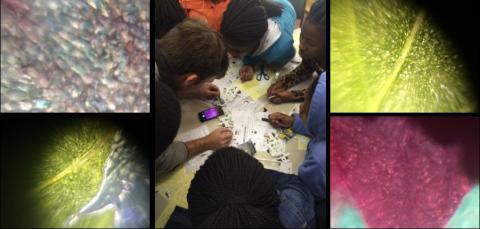
The Foldscope also comes with a feature which permits one to attach a smartphone to it, allowing the learners to take pictures and zoom into what they see. This experience left our learners quite scientific- minded :). They got to keep their foldscopes as well as extra lenses that they got from Max. Experiments like these help boost how people see and think of things. Our learners can now be their own scientists and use their foldscopes to explore what they cannot see with the naked eye!
Thank you to Max for this DIY / Biology workshop and the Masinites that took part!

As Eddie Robison once said, “The will to win, the desire to succeed, the urge to reach your full potential…these are the keys that will unlock the door to personal excellence.” This desire to succeed in academics allowed the Ikamvanites to receive Dr Khubeka, a learning development facilitator for the Academic Development Centre at the University of Johannesburg, for a study skills and career guidance talk.
Dr Khubeka has been part of Ikamvayouth family providing study skills and career guidance talks for many years and his involvement has been beneficial to Ikamvanites, playing an important role in transforming the lives of Ikamvanites through his workshops. Ikamvayouth branches always equip learners with the necessary tools needed to survive and career guidance is one of IkamvaYouth programmes that is being implemented at all our 13 branches. This year Dr Khubeka visited the Ebony Park Branch and conducted workshops with learners from grade 9 to 11. Now that the learners are preparing for their midyear examinations Dr Khubeka came at the right time to inspire them with wisdom on how to tackle different examination questions.
Dr Khubeka covered the following topics in his presentation:
? How to take Examinations and Tests
? Types of Examination Questions
? How to analyse an Exam question
? How to prepare for the study Break
? Tips for Exam success
? Time Management and goal setting
? Analyzing an assessment and how to make summaries

Dr Khubeka’s sessions encourages learners to stay calm in exams, and not to panic, also to be around positive people in times of examinations. Furthermore, he inspired learners to be open minded in their studies. Ikamvanites gained practical advice and techniques to use whenever they are in examinations.
The workshop was extremely valuable for the Ikamvanites and I believe that they received more concrete ideas to use in their studies. One of the Grade 11 learners Thato Shumba said, “The workshop energizes and refocuses my passion to excel in my studies, I am happy that I now know how best to answer examination questions from now going forward.”
The workshop was an eye opener to the Ikamvanites since they were fully loaded with different skills to use when dealing with different examination questions. In his closing Remarks Dr Khubeka urged Ikamvanites to do their best and be confident in their exams.


On the 5th of March 2016, IkamvaYouth alumni and tutors were invited to attend a workshop aimed at helping them improve their CV writing and interview skills. This was an opportunity for our Ikamvanites to learn some valuable job hunting skills from each other, as well as from our HR manager and Communications Coordinator, who co-facilitated the workshop. We asked one of the workshop attendees, Aphiwe Sobutyu to give us his take on the event. Here’s what he had to say:
It was a day filled with fun and surprises when I attended a CV writing workshop with other IkamvaYouth Alumni. I always thought that my CV was OKAY… but guess what, I was fooling myself, because on that day I discovered that my CV is [not that great] and it needed to be pimped.
On the day of the workshop I learned that no matter what job or industry you’re applying for, you will need a CV in the process of the application, we were also told about which information to include in our CVs and why it is important to tell it as it is, for it represent who you are and the other things that you have engaged in, in the past.
That was a very great workshop and I hope it can spread from the alumni group to the learners, for they can benefit from it and be equipped with the right skills – learning CV writing while they still in high school.
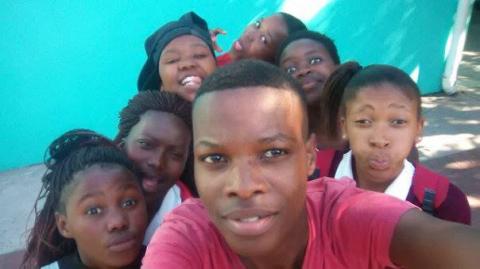
Aphiwe matriculated in 2012, and is currently studying Public Management at CPUT. He is also a dedicated tutor at the Nyanga branch.
IkamvaYouth is committed to supporting its alumni and tutor community through providing access to various opportunities for self-development. The next workshop is coming up on the 20th of May (Yip, that’s TOMORROW!), check out the details here.
Alex and I have been attending the Education NGO Leadership Summit in Benoni today, hosted by the National Education Collaboration Trust (NECT).
Godwin Khosa (NECT’s CEO) explained the reasons behind NECT’s focus on interventions at the district level; he said that ultimately, we need to focus on interventions that hold potential for changing the system as a whole. Hence, they are not focusing on the level of the learner, or at that of the school. He said that while NECT could hold Saturday classes and see increased improvement in Maths and Science, these initiatives take a lot of effort, are not systemic, and have a lower sustainability potential.
And I agree with him, in that it’s clear that the system needs an overhaul, with the functionality of schools, districts and provinces increasing dramatically. However, I’m really concerned about the idea that working at the “learner level” is seen as too much effort, unsustainable, and not systemic.
We all know that the learners currently enrolled in the system are in dire need of remedial support to overcome the deficits in their grasp of the basic fundamentals, especially with regard to literacy and numeracy. 27% of our grade 6 learners are functionally illiterate (SACMEQ, 2007), grade 9s scored an average 14% in Maths in the ANAs (2014), and only 3% scored more than 50%. In 2015, the matric pass rate was 71%, but due to heavy grade dropouts, the cohort pass rate was actually just 41%.
Khosa outlined the achievements of NECT to date. While there were some references to “evidence of improvement in the organisation of schools,” the achievements were primarily limited to a list of outputs (number of principals and HODs trained, number of resource packs availed, flash cards, management trackers, etc.) rather than outcomes. Now, while Khosa is absolutely correct that expecting to see improved learner outcomes from NECT in this early stage of its operations (just two years), I am unconvinced that this approach is sufficient for ensuring that 90% of learners pass Maths, Science and Language at above 50% level by 2030 (NECT’s very important and compelling overall objective).
As I outlined in the interview with Business Day a few weeks ago, learners’ gaps in understanding and comprehension, particularly when it comes to STEM and language subjects, require individual attention and personalized learning experiences. And while ICT provides some opportunity for offering personalised and responsive learning experiences at scale, all ed-tech people will tell you, the tech is only ever going to be a small part of what it takes to improve learner achievement.
Learners need relationships, with people who give them time, who build their trust, who help them to figure out where their gaps and challenges are, and then provide them with the academic and psycho-social support they need to dramatically improve their results and confidence. In some homes (mostly in middle class homes), parents and caregivers have the education and time to do this. Most middle class families also enroll children in after-school tutoring programmes.
Unfortunately, this additional support is unavailable to the majority of our country’s learners. It is unrealistic to expect that the education system can provide this level of individualized support to learners, especially when we consider the psycho-social challenges that learners in the lowest quintiles are up against. But the view that doing so is too difficult will ensure the perpetuation of our learners’ dismal academic performance. How can we produce outcomes at the learner level, without working with learners?
Lynn van der Elst, from Miet, said that we need to better understand Government, to put ourselves in their shoes and try understand why things work the way they do. And I think that this important point speaks to the impetus behind NECT’s decision to focus at the district level and above, as levers that make sense for systemic interventions. Government’s job is to serve the 12 million learners who are supposed to be enrolled in the system. Just providing learning materials to 12 million learners must be a colossal challenge, and so it’s unsurprising that the provision of textbooks and digital learning resources is hailed as a systemic intervention, despite the lack of empirical evidence that this will lead to improved academic achievement.
Speakers also spoke about the role of NGOs as innovators, and called for increased collaboration and stronger networks of support. The National Development Plan highlights active citizenry as one of its core pillars, and most of the speakers identified the promotion and creation of active citizenry as a key role for civil society. It is these active citizens that can step up and provide the intense level of support and care that learners need, so that we can see the kinds of radical shifts in academic achievement so desperately needed.
IkamvaYouth’s volunteer tutors and mentors are evidence of what’s possible when citizens become active. Most of these volunteers are university students, and many used to be learners in the programme themselves. By consistently showing up to meet learners where they’re at, they effectively assist learners to dramatically improve their academic results, and go on to access tertiary education, learnerships or jobs. We’re working with almost 20 other tutoring and mentoring programmes, towards achieving collective impact, and together, we will be reaching 3000 learners this year.
Deputy Minister Mr Enver Surty challenged us about the tiny size of our interventions, and encouraged us to think big. “How do we take the principles and vision of the NDP into practical reality?” There were many NGOs in the room who are indeed promoting, inculcating and coordinating active citizens. NGOs like Enke, Fundza, TEACH South Africa, Room to Read, WESSA, Partners for Possibility, Equal Education, Bridge, Section 27 and Breadline Africa. NGOs who are inspiring, recruiting, equipping and coordinating active citizens to roll up their sleeves and get involved in educating learners, providing a pipeline of educators, supporting principals, improving schools, challenging policymakers, and ultimately working towards the NDP’s big goals. While many are working together already, there is always room to better leverage the potential of collaboration. And it is only through collaboration that we’ll be able to operate at the scale that makes sense to Government.
The meeting began with a screening of Thandi’s story, which so smartly illustrates the challenges that the NDP aims to address and overcome. When Trevor Manual spoke at IkamvaYouth’s ten year birthday bash, we screened Funeka’s story, to illustrate the impact that after-school tutoring and career guidance mentoring can have. A meaningful way to contribute towards the NDP’s implementation for civil society is to mobilise and activate citizens, and to coordinate our efforts, with each other, and with Government, so that together we can reach more learners like Thandi and enable them to leverage education and improve their lives, just like Funeka.
We appreciate NECT’s efforts to bring us together, and are looking forward to future engagements. Thank you for this opportunity, which we hope is just the beginning of a more cohesive and collaborative approach to realising the NDP.
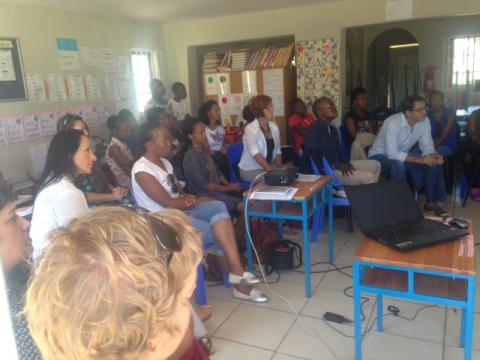
Moving from one place to a desired place entails beginning with an end in mind. A wise man once said “It’s very hard to be successful without having a good mentor, it is essential to have someone you can look up to and emulate. Also, a mentor will show you the tricks and pitfalls of the game because they have likely already been around the block.” – Varun Gulati

On this day, 5th of March, IkamvaYouth Ebony Park branch together with Comensa held its mentorship workshop. As part of the five IkamvaYouth programs, Mentoring has been a crucial element in achieving IkamvaYouth goals and Mission. Gauteng Ikamvanites in grade 12 and 11 had the opportunity to network with professionals from different organization where mentoring was the main objective of the day.
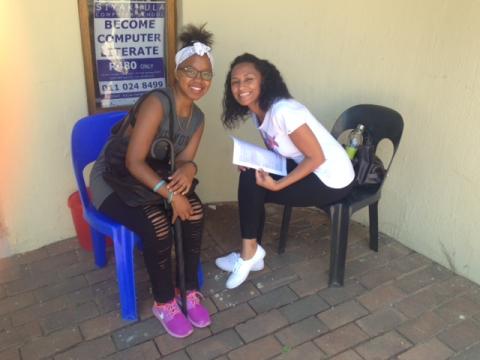
On the day, mentors/coaches were given time to introduce themselves and tell Ikamvanites what they bring to the table and how it can beneficial in the long run. The Kolb Learning cycle was used as an example to learners so that they can better understand what role the mentor plays in the mentorship relationship. Ikamvanites participated in a session where expectations and roles were dealt with. Amongst the roles discussed was that a mentor is a facilitator, advisor, source of information, and amongst other things, a networker. Ikamvanites were urged to take charge and drive the agenda.
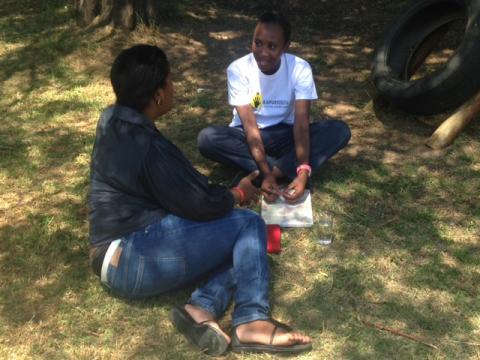
As it was said before, IkamvaYouth enables learners to make a transition from one current state to another state through mentoring and its other programmes. Through mentoring IkamvaYouth is hoping to Increase high school graduation rates; lower the high school dropout rates, encourage healthier relationships and lifestyle choices; create better attitudes towards school; increase University/college enrolment rates and educational aspirations; enhance self-esteem and self-confidence; improve behaviour both at home and at school; strengthen relationships with parents, teachers, and peers; improve interpersonal skills for learners and decrease the likelihood of drug and alcohol abuse.
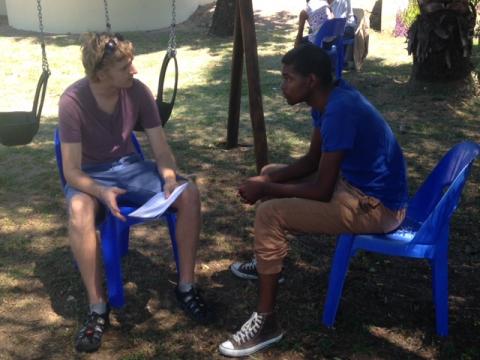
As they say “It takes a village to raise a child” and Ikamvayouth is challenging you to join its mentoring program and help a child realise that their dreams are possible.
Their future is in their hands!!

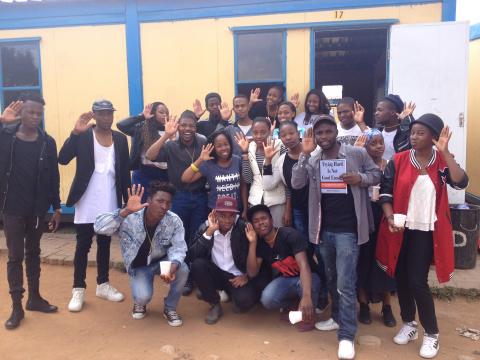
During the third term of 2015, IkamvaYouth carried out a feedback project, aimed at engaging our alumni community, and giving them the opportunity to participate in the development of the alumni programme going forward. The project included running an online survey which was completed by both 2015 matric learners and alumni (a total of 165), as well as two workshops: the first was in Gauteng on the 17th October 2015 (with 19 matric and alumni participants from Ivory Park and Ebony Park branches), and the other in Cape Town on the 27th November 2015 (with 10 matric and alumni participants from Makhaza and Nyanga branches). Here’s a sneak peak at the results:
The Good News…
- Alumni find our programmes helpful in preparing them for post-matric life
- They are proud advocates of the organisation

- They want to participate in alumni programmes
- They want to stay connected to IY and contribute in-kind as well as financially
But…
- Alumni can’t give back if they’re struggling (financially and otherwise)
- Not all the ideas offered are feasible: So we need to manage expectations
- IY needs to start supporting alumni not in tertiary (e.g. FET, unemployed, upgrading matric)
So, our next steps are to:
- Ensure communication and feedback of key issues between the alumni and IY
- Share opportunities (jobs/funding/study/etc.) via emails and social media
- Host Meet-Ups every term (incorporating needed skills workshops such as CV & Interview skills)
- Source/develop and share guides/booklets with important info (e.g. adjusting to university), and work with branch staff to ensure that these are shared (through workshops & talks) with matric learners
- Pilot a campus support structure in WC
- Promote the individual giving campaign among our alumni who are employed
For a more detailed look at the findings of this project, please
click here to access the full report.
Thank you so much to all the alumni who participated so enthusiastically in the survey and workhops!














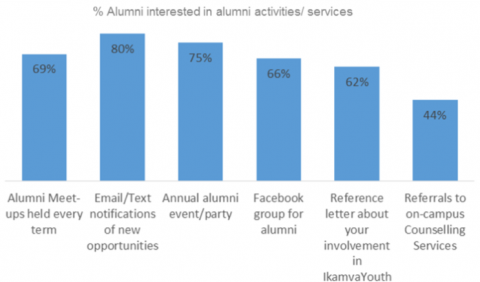
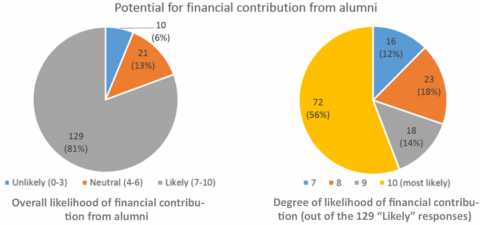
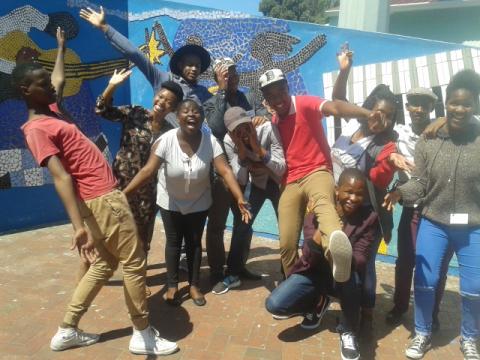
 Lloyd Lungu
Lloyd Lungu